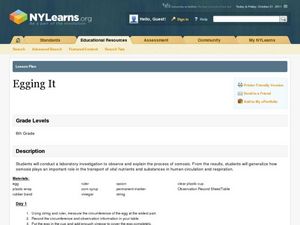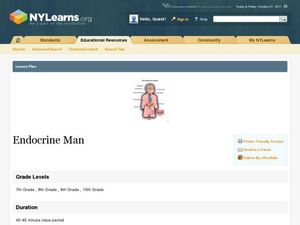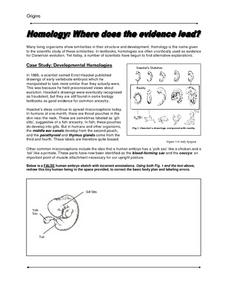Curated OER
Where Does Food Go?
Students understand how their food moves through the digestive system. In this digestion lesson plan, students measure the length of the digestive system from a projection of it. Students draw their own pictures of the digestive system.
Curated OER
What Does The Heart Do?
Students study the relationship between the heart and circulation. In this circulatory system lesson, students read the "What Am I?" article about the heart and discuss. Students draw a heart and lungs, discover how blood is pumped...
Curated OER
Circulatory System Travel Brochures
Students study the human circulatory system including the role of the heart. They design brochures that describe a voyage through the human circulatory system.
Curated OER
Egging It
Sixth graders discover scientific processes by conducting an experiment in class. In this osmosis instructional activity, 6th graders utilize eggs, cooking ingredients, string and plastic cups to create an experiment in which they watch...
Curated OER
Endocrine Man
Students identify the parts and function of the endocrine system. In this biology lesson, students draw a man and label the glands of the endocrine system. They present their poster in class.
Curated OER
Fun Bones
Students learn different bones of the body while using various body awareness concepts.
Curated OER
The Journey of a Red Blood Cell
Fifth graders examine how a red blood cell travels throughout the body. Using a model, they follow the flow of blood throughout the entire body. They identify the functions of the lungs and discuss the difference of the blood entering...
Curated OER
Ancient Creature of the Deep
Students compare and contrast the coelacanth, a living fossil, with a moray eel and a bull shark. They complete a Fish Anatomy worksheet while researching the skeleton, body coverings and buoyancy of each fish.
Curated OER
Crab Lab
Young scholars participate in an activity in which they observe the behavior of a crab. In groups, they label and identify the function of each main part while observing and record their behavior. They make educated guesses on why they...
Curated OER
Ya' Gotta Have Heart
Fourth graders study the parts of the human circulatory system and how they function. They design a flow chart of the circulatory system and use data to construct charts and graphs.
Curated OER
Learning About Bears And Dolphins
Seventh graders engage in a study that compares the body structures of bears and dolphins. They conduct research to find information and use questions to find the differences or similarities and then conduct a class discussion about the...
Curated OER
Circulatory System
In this circulatory system worksheet, learners use an internet program to observe the circulatory system and answer short answer questions about it. Students complete 21 short answer questions.
Curated OER
Human Skeletal System
Learners trace the outline of one of their members and draw in the bones from the diagram. They make flashcards of the bones out of index cards. Once the drawings and flashcards are finished, they quiz each other in preparation for a game.
Curated OER
Rivers Run Through It
In this mapping practice worksheet, 5th graders read an informational paragraph and answer 7 questions about the parts of a map along with places shown on a given map.
Curated OER
The Heart
Pupils are introduced to the parts of the heart and the flow of blood through the heart.
Curated OER
Homology: Where Does The Evidence Lead
High schoolers are introduced to the topic of homology. In groups, they read a case study and compare different drawings of early vertebrate emryos. They work together to answer discussion questions and label the various parts of each...
Curated OER
What Do We Have In Common?
Seventh graders perform a dissection on a mussels and label their internal organs. In groups, they compare and contrast the mussels structure to those of human beings. They also review the functions that are necessary for survival and...
Curated OER
Latin American Relief Map
Students, in groups, research, design and construct a relief map of a section of Latin America using papier-mache. They show major landforms, elevations and notable bodies of water. They present their maps to the class.
Curated OER
The European Union 3
Sixth graders identify countries in the European Union (EU).They consider the positives and negatives of group membership. Students create a mock governing body for their school and make a membership ID.
Curated OER
The Cassini Robot
Pupils compare the functions of a robot to that of the human body. In this technology lesson, students identify the important components of the Cassini robot that would enable it to carry out space missions. They design and build their...
Curated OER
SNACK SACK
The student will experience the concepts of ratio and production, using agricultural products considered snack foods. 2. The student will analyze and record information from the class experience.Bring in a wide assortment of packaged...
Curated OER
Observation of a Living Earthworm
Sixth graders examine earthworms and their parts. In this earthworm lesson students complete a lab worksheet on the earthworm and test its response to certain factors.
King County
Reproductive System
It's every health and science teacher's favorite subject to cover: the reproductive system. This comprehensive lesson introduces adolescents to the reproductive anatomy of men and women with the help of a series of diagrams,...
Curated OER
Earth's Heavenly Treasures: Hummingbirds
Young ornithologists watch an informative video and use the Internet to gather data about the life, size, habitat, and migration of hummingbirds. The interdisciplinary lesson includes activities that target art, science, math, and...























